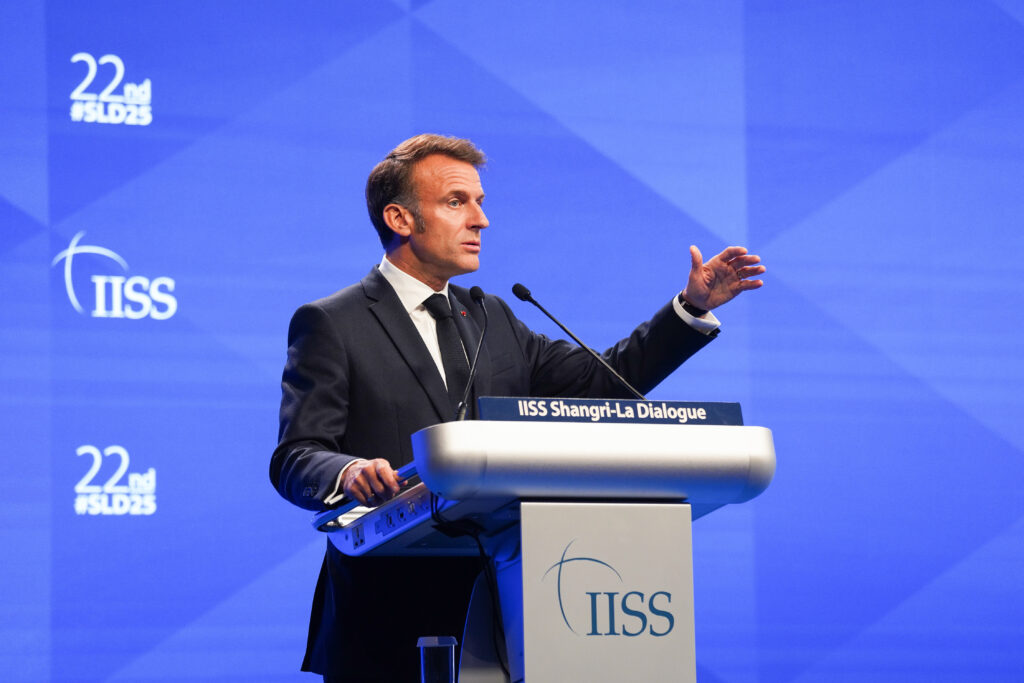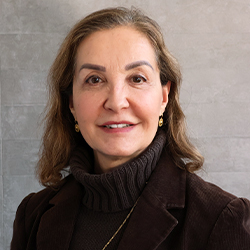Interviews / Asia-Pacific
2 June 2025
Assessment of Emmanuel Macron’s Asian tour: breathing new life into France and Europe’s Indo-Pacific strategies

Emmanuel Macron’s tour of Southeast Asia from 25 to 31 May 2025 enabled him to further develop the contours of a French Indo-Pacific diplomacy which, unlike the American administration, closely links European and Asian security issues and seeks to organise new coalitions to counter the growing fragmentation of the international order. His rejection of “double standards”, his insistence on the need to provide credible responses to the war in Ukraine and the humanitarian crisis in Gaza can also be seen as an attempt to reduce the trust deficit between the Global South and Western countries. However, it also highlighted existing divergences between the United States and most European countries on these crucial matters, prompting Asian nations to question the extent of American commitment to the region in contrast with a seemingly more engaged France and Europe. We discuss this with Marianne Péron-Doise, Research Director at IRIS, Co-Head of the Asia Programme and Director of the Indo-Pacific Geopolitical Observatory.
What are the key takeaways from Emmanuel Macron’s visit to Southeast Asia?
During his visit to Southeast Asia, Emmanuel Macron primarily sought to reassure—and in doing so, he did not limit his message to the three countries visited (Vietnam, Indonesia and Singapore) but rather addressed all Southeast Asian countries, whose centrality in terms of economic growth and political relevance is essential to both French and European Indo-Pacific strategies.
Throughout the trip, Emmanuel Macron delivered a highly calibrated speech with references to multilateralism—a concept thought obsolete following the shock of the war in Ukraine—while stressing the importance of dialogue and cooperation. He proposed a reading of international relations focused on respect for sovereignty, rejection of power dynamics, equality among states, and the sanctity of borders. He thus laid out a vision and form of partnership that markedly diverges from dominant narratives—be they from Chinese leader Xi Jinping or the new American administration—both of which adopt discourses rooted in authoritarian logic. Each seeks to leverage its position of strength to exert pressure—economic in the case of the US, political-military for China.
This is not new for Southeast Asian countries that have for decades attempted to navigate between China and the United States. Until recently, Washington’s ability to maintain relative strategic stability in the region could be seen as a positive factor. ASEAN had, to an extent, structured itself around China as a trade partner and the US as a military one. This is no longer the case.
It is no minor paradox to see the United States—once a staunch defender of international law and regulated inter-state relations based on respect and equality—now exert pressure and resort to coercion against its neighbours and partners, in defiance of any cooperative logic. The French and European stance, by contrast, is to reject this approach rooted in power politics. President Macron’s discourse throughout his week in Asia was unequivocal in this respect, drawing attention not only from his hosts but across the region, precisely due to its coherence. It is the same vision outlined in France’s Indo-Pacific strategy since its 2019 release, emphasising multilateralism, cooperation, and partnerships. This enabled Macron to skilfully present France as a “reliable” partner.
That message resonates especially in a context where the Chinese navy is becoming increasingly aggressive in the South China Sea and the Taiwan Strait, and the United States is launching an all-out trade offensive. Indo-Pacific countries (and others) seem more inclined to listen to a balanced message that nevertheless denounces the law of the jungle, as they feel increasingly battered by their traditional partners, China and the US.
In essence, this lengthy presidential sequence in Asia reprised, with consistency, the same themes Emmanuel Macron has developed on previous visits to the region since 2018—in India, Australia, Thailand (for the 2022 APEC Summit), the Pacific Ocean (2023), and most recently in April 2025 in the Indian Ocean with a noteworthy visit to Madagascar. Since his first term, Macron has adopted the Indo-Pacific nomenclature and turned it into a key concept renewing France’s Asia policy by highlighting its presence—its territories and deployments, especially military. France’s repeated message—to avoid polarisation and instability in the Indo-Pacific due to increasing Sino-American rivalry and multiple crisis hotspots—takes on greater significance here. The president can then credibly evoke, without sounding unrealistic or arrogant, a narrative of France as a “power of peace and balance”, even speaking of a “third way”.
Were any bilateral cooperations more notable than others during the French president’s visit?
The choice of Vietnam, Indonesia and Singapore—long-standing French bilateral partners—clearly shows that strategic stakes were just as decisive as economic ones for France, the host countries, ASEAN, and the EU more broadly. The visit had a strong economic, commercial and diplomatic dimension, with the signing of numerous high-value contracts. The French delegation included many representatives from business and the defence industry, which does not contradict France’s multilateral vision, as it supports the political and economic sovereignty of all parties, including the EU.
For all involved, the goal was to tackle the challenge of diversifying sources, value chains and supply lines, in order to reduce dependence on certain countries and, more generally, retain the freedom to choose partners. France stands to benefit from this as much as Vietnam, Indonesia, or Singapore.
In Vietnam alone—during the first visit by a French president in a decade—around thirty agreements were signed totalling approximately €9 billion, covering renewable energy, infrastructure, and air transport. One might wonder why France had not previously given more attention to this Francophonie member country, which is experiencing rapid development. With an annual growth rate of 6% and a young, well-educated population rich in engineers, Vietnam is a true technological hub. China has outsourced there—a move criticised by Donald Trump, who responded with a punitive 46% tariff rate! The new US administration’s unilateral trade policy has led to record-high tariffs on Southeast Asian countries, whose economies are highly dependent on trade.
President Macron can take pride in the 20-Airbus purchase deal signed in Hanoi, but also in the warm reception his stance on a rules-based international order received. Vietnam is emblematic of a country caught in both a significant trade dispute with the US and a territorial one with China, which challenges a large portion of its maritime space. Hanoi continues to call for respect for the UN Convention on the Law of the Sea (Montego Bay). In this context, France’s positioning as a “balancing power” finds strong resonance: Vietnam itself strives to maintain a balance in its relations with both China and the US, to optimise its strategic and commercial interests, in line with its so-called “bamboo diplomacy”—a flexible approach that bends without breaking.
Finally, it is worth highlighting that although the tour was focused on Asia, it also allowed for important global diplomatic messaging—especially regarding the perceived “double standard” between the war in Ukraine and the Gaza conflict. In Indonesia—the world’s largest Muslim-majority country—President Macron openly addressed the humanitarian situation in Gaza, responding to a deeply concerned and critical public opinion. Indonesia has offered to take in refugees and the wounded but does not recognise Israel as a state. Macron reiterated France’s historic support for a two-state solution and aimed to prepare the ground for the upcoming international conference on Palestine in New York, which Paris is expected to co-chair with Saudi Arabia.
Macron had a clear message for each leader: for Donald Trump, a defence of trade rules over the “law of the jungle”; for Xi Jinping, a reminder that France is a partner respectful of sovereignty; and for Vladimir Putin, a statement—delivered in front of countries like Vietnam and Indonesia still reliant on Russian arms—that Russia’s war in Ukraine, with North Korean support, destabilises Asia as much as Europe.
How does this visit contribute to a new era of cooperation between France and Southeast Asian powers, particularly in security and defence, as President Macron outlined on Friday 30 May in Singapore at the Shangri-La Dialogue?
President Macron’s participation in the Shangri-La Dialogue—this major annual security forum attracting growing numbers of high-level diplomatic and military figures from the region and beyond—can be seen as the high point of his Asian tour. There, he delivered a speech outlining the foundations of a renewed but consistent French Indo-Pacific strategy, rooted in multilateralism, sovereignty, and partnerships.
His opening address, eagerly awaited, focused on five key points that reiterated the themes of his visits to Vietnam, Indonesia and Singapore. Some of these were challenged the next day by US Secretary of Defence Pete Hegseth, who flatly denied any link between European and Asian security (“the ‘N’ in NATO stands for North Atlantic”) and summarised US strategy in the region as “Peace through strength”, alongside a fierce attack on “Communist China”.
From Macron’s speech, what stands out is his rejection of “double standards” and insistence on the interconnectedness of European and Asian security. Ukraine cannot be seen as merely a European war: if Russia is allowed to seize Ukrainian territory, what would the reaction be if something similar happened to Taiwan or the Philippines, he asked. Similarly, as he stated in Indonesia to President Prabowo Subianto and Indonesian students, he raised the situation in Gaza and reaffirmed his support for recognising a Palestinian state as a moral imperative.
The importance of strategic autonomy—for France, Europe, and ASEAN—was strongly emphasised, especially in response to revisionist states seeking to build spheres of influence. While the president made clear he wished to cooperate with all, he was equally firm in stating he did not wish to be dependent. Unlike some Asian partners such as Japan or South Korea, he reiterated that NATO had no role to play in Asia. However, he turned China’s own argument around, pointing out that if Beijing opposes NATO’s involvement in the Indo-Pacific, it must prevent North Korea’s involvement in a European war.
He also referred to the “third way” proposed by France—at the heart of its Indo-Pacific strategy for five years (currently under revision)—and its ambition to contribute to an open environment that respects regional sovereignty. This stance is not about neutrality or equidistance between the two regional superpowers—China and the US—of which France remains an ally.
Lastly, President Macron adopted a pragmatic and realistic tone, calling for stronger France-ASEAN and EU-ASEAN ties, and the creation of new coalitions—stable, independent, action-oriented—to uphold an international order based on rules, not force.

